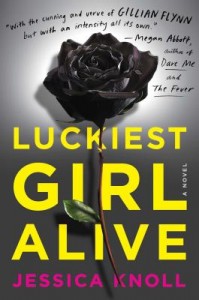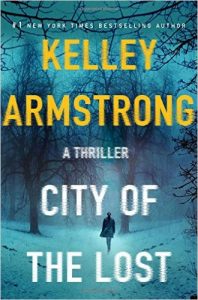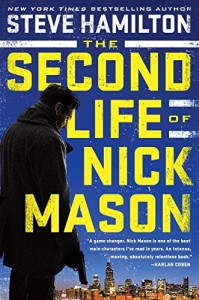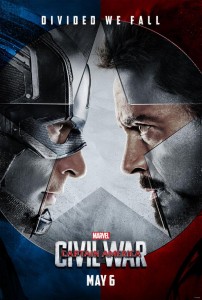We changed the first word of the name this time to spotlight our first topic: the proliferation of book titles with Girl in them, and of comparisons to those famous Girl books by Gillian Flynn and Paula Hawkins. We’re not the first people to have noticed this trend but we really thought it’d be over by now.
We don’t know how regular this feature will be since we’re both world champions in laziness, but why worry about the future?
The transcript was edited for length and filthiness, mostly on Lauren’s part.
PCN: Let’s get the important details out of the way first. Since part of this chat is about snacks, what do you have on hand right now?
L: I’ve failed out of the gate. No snack. Can I still hang out? Or do I have to go get something?
PCN: It doesn’t have to be right there with you, just somewhere in your house.
L: Oh wait! I have some Trader Joe’s honey wheat pretzel sticks that have been open for a month. I’ll get those.
PCN: OK. I’ll wait. [Ed. note: We’re not sure how you can handle all this intellectual talk.]
L: Phew. On to the less appetizing portion of the program. Hold on while I get the twist out of my shorts…
PCN: You have pretzel twists in your shorts?
 L: That would be better than the one I have there now about the This is the next Gone Girl/Girl on the Train! phenomenon in book publicity.
L: That would be better than the one I have there now about the This is the next Gone Girl/Girl on the Train! phenomenon in book publicity.
PCN: Ohhhh, I get it. Clever transition.
L: What is it about it that I hate so passionately?
PCN: I’m too scared to crawl inside your head. Why don’t you go ahead and unload?
L: Where to start? So many things bother me about it. It doesn’t let an author have his/her own identity without being compared to someone else’s success. I say his/her but I’ve NEVER seen it done to a male author, and that bugs me. None of the books compared seem to have much in common with either GG or GOTT. And last but not least, I loved one of those books and hated the other. So what am I supposed to think when a book is “the next” of both? How’s that for a palette of pissed off?
PCN: Your pissed-off palette has many colors.
L: I am the Jackson Pollock of irksome book publicity.
PCN: I agree this trend is lazy. It slaps a label on new books that’s supposed to entice us to read them, but it has done the opposite for me—make me groan and want to avoid them. If a book has merits, let it stand on its own.
L: Ha! I love that you see the laziness in it. It is lazy. Let Author X be the first Author X, not the next other author.
PCN: Exactly! And as you said, I didn’t love Girl on the Train, so if a promo says, For lovers of GOTT, I’d probably skip it.
L: I know we both tend to avoid books that use the comparison, but what do you think when it uses both? Because you, like me, liked Gone Girl, right? GG and TGOTT were two entirely different books! With GOTT, the author had trouble writing unique characters of either sex. All the men and all the women had the same issues. GG, on the other hand, was about a whip-smart woman who was controlling her life and things in it and the characters were unique.

PCN: For me, it’s more GG is a superb book and GOTT is subpar. Some of the recent blurbs I’ve seen say, For lovers of GOTT and Luckiest Girl Alive. Which is also confusing, because again, different books. And LGA itself was touted as the next GG.
L: I think LGA is closer to GG. Part of what bothers me about it is that publishers have to cram it down the public’s throat that women can write thrillers. Women have been writing thrillers, good ones, for a damn long time.
Interestingly, I just read a book I thought was similar to GG. It was written by a man, so did not suffer from the lazy publicity ploy, but one author did blurb it as being like GG. I’ve thought about why this book (Perfect Days, if you’re interested) did not get that label.
The real answer is I have no idea, but I’m guessing because (1) the author is a man and (2) it didn’t seem to get a ton of publicity. I’m not sure why this publicity trend doesn’t include male authors, too, because using Girl in the title has crossed over [to books by both genders]. But I suppose that’s another different issue that irks me? ☺
PCN: You’re right. Male authors’ books are less often compared to GG/GOTT, which is ironic, since a man started this recent Girl trend: Stieg Larsson.
L: Right? Did you ever see a book say The next Girl with a Dragon Tattoo? Why not?! Because people didn’t think those books were well written? Because Larsson was a man and we can’t compare women and men writers? It all feels very silly, but maybe there is genius behind it somewhere.
PCN: Or sexism?
L: It’s a can of worms, but I think you’re right.
PCN: I don’t think it’s intentional sexism, maybe subconscious.
I did see books touted as the next Dragon Tattoo but only for a little while. It didn’t become a thing that won’t go away. GG was released 4 years ago and new releases are still being compared to it.

This is a free stock photo from Pexels.com. I eat my waffle-cut chips, not take pictures of them.
(BTW, my Srichacha chips are so good. They are spicy and waffle cut.)
L: You and your hot things. I tried sriracha once. Once was enough.
PCN: We haven’t mentioned the fact that not only are too many books being touted as the next GG, they all have Girl in the title, too.
L: We kind of broached it above. I’m not sure if that’s the same issue or just another lazy issue. It’s interesting to me that that does happen with books written by men. So we can share title publicity stunts so long as the sexes are not compared to each other?
PCN: Something like that. Have you ever seen a book by a woman compared to Dragon Tattoo or book by a man compared to GG?
L: I don’t recall seeing a female author compared to either Dragon Tattoo or Larsson himself, but my memory isn’t the best. [Raphael Montes’s] Perfect Days is the only book I can recall by a male author compared to GG, but again, it was not the publisher but another author—a female one—in a cover blurb.
PCN: Sometime last year, I think it was around June, I started keeping a list of all the Girl books being pitched or sent to me. The list has more than 30 entries so far.
L: I have thought multiple times about keeping a list of books compared to GG/TGOTT, but then I pull a muscle when I sigh and can’t pick up a pen.
PCN: You don’t need a pen. It’s called a computer or your phone. How are your month-old pretzel sticks, by the way? Are they still good or do I need to send firemen to your house for chest compressions?
L: I was going to say they are fine until you got to firemen. FIREMEN, PLEASE!
PCN: OK, on their way. Hope you have pants on. Or not.
L: I won’t by then. Bazinga!
PCN: My eyes!
L: Send four firemen. It’ll take that many to untwist my shorts.
PCN: Damn, girl. (<<Not to be confused with GG or GOTT.)
L: Well played. Now that my firemen are gone, let’s get back to books. What are you reading that’s knocking your socks off (or not)?
PCN: Lily and the Octopus by Steven Rawley. It’s really good so far and doesn’t remind me of any other book! [I’ve finished this. Will post review soon.] What are you reading?
L: I am in the midst of a trifecta of great reads, so I’m almost afraid to mention them. I’m listening to Notorious RBG by Irin Carmon. My ebook is Dodgers by Bill Beverly, and my tree book is Consequence by Eric Fair. I would have been really embarrassed if I was reading something with Girl in the title right now.
PCN: I’m looking at my huge TBR stack. No Girl titles at all.
L: My three-year-old boyfriend is here for our grass date. I will talk to you later?
PCN: Yup. Happy reading until next time!
 ” ‘I killed a man,’ I say to my new therapist.”
” ‘I killed a man,’ I say to my new therapist.”
 Shane Black, the screenwriter who shot to fame with the Lethal Weapon movies, may have had a few stumbles in the last three decades, but with The Nice Guys, a 1970s noir detective story Black cowrote with Anthony Bagarozzi, Black is firmly in his element.
Shane Black, the screenwriter who shot to fame with the Lethal Weapon movies, may have had a few stumbles in the last three decades, but with The Nice Guys, a 1970s noir detective story Black cowrote with Anthony Bagarozzi, Black is firmly in his element.
 L: That would be better than the one I have there now about the This is the next Gone Girl/Girl on the Train! phenomenon in book publicity.
L: That would be better than the one I have there now about the This is the next Gone Girl/Girl on the Train! phenomenon in book publicity.

 I’ve been reading a couple of books in which a woman experiences or witnesses something shocking and she tells someone or several people. And no one believes her, not even her closest family members and friends.
I’ve been reading a couple of books in which a woman experiences or witnesses something shocking and she tells someone or several people. And no one believes her, not even her closest family members and friends. Fredrik Backman earns a hat trick with his third novel, Britt-Marie Was Here. This witty, heartwarming, all-around charming novel features sixtysomething, recently separated Britt-Marie. Those familiar with My Grandmother Asked Me to Tell You She’s Sorry will recognize the character from Elsa’s apartment complex, but that’s the only connection to Backman’s second book.
Fredrik Backman earns a hat trick with his third novel, Britt-Marie Was Here. This witty, heartwarming, all-around charming novel features sixtysomething, recently separated Britt-Marie. Those familiar with My Grandmother Asked Me to Tell You She’s Sorry will recognize the character from Elsa’s apartment complex, but that’s the only connection to Backman’s second book. Steve Hamilton breaks from his Alex McKnight series and introduces Nick Mason. Mason was in prison for murdering a federal agent, but Darius Cole, a Chicago crime boss—and fellow inmate—makes Mason’s conviction go away. He’s free and clear, no probation, no record, nothing…except the deal he made with Cole to achieve his liberation.
Steve Hamilton breaks from his Alex McKnight series and introduces Nick Mason. Mason was in prison for murdering a federal agent, but Darius Cole, a Chicago crime boss—and fellow inmate—makes Mason’s conviction go away. He’s free and clear, no probation, no record, nothing…except the deal he made with Cole to achieve his liberation. Meridian Wallace is a brilliant student studying to be an ornithologist when she meets a physics professor and falls in love. Early in their relationship, he moves to the remote southwest to work on a top secret project.
Meridian Wallace is a brilliant student studying to be an ornithologist when she meets a physics professor and falls in love. Early in their relationship, he moves to the remote southwest to work on a top secret project. Secrets are powerful, perhaps never more so than when kept within a family. Truth is often a gray, fuzzy line. Sometimes we seek answers, but in the words of One of Those Songs from the 1980s, it’s the questions we have wrong.
Secrets are powerful, perhaps never more so than when kept within a family. Truth is often a gray, fuzzy line. Sometimes we seek answers, but in the words of One of Those Songs from the 1980s, it’s the questions we have wrong. Mary Kubica is quickly becoming one of my favorite multi-POV authors. This time, the reader is tossed between Quinn and Alex—Quinn an admittedly flawed twentysomething who wakes one morning in her Chicago apartment to find her beautiful, smart, church-going roommate Esther missing; Alex an 18-year-old living an hour away from Quinn in Michigan, working as a dishwasher and trying to keep his alcoholic father afloat.
Mary Kubica is quickly becoming one of my favorite multi-POV authors. This time, the reader is tossed between Quinn and Alex—Quinn an admittedly flawed twentysomething who wakes one morning in her Chicago apartment to find her beautiful, smart, church-going roommate Esther missing; Alex an 18-year-old living an hour away from Quinn in Michigan, working as a dishwasher and trying to keep his alcoholic father afloat.
 One minute, a five-year-old boy is walking home with his mother. The next, he’s dead, hit by a car after letting go of his mother’s hand to run ahead. As if the situation weren’t nightmarish enough, the driver takes off without stopping.
One minute, a five-year-old boy is walking home with his mother. The next, he’s dead, hit by a car after letting go of his mother’s hand to run ahead. As if the situation weren’t nightmarish enough, the driver takes off without stopping.